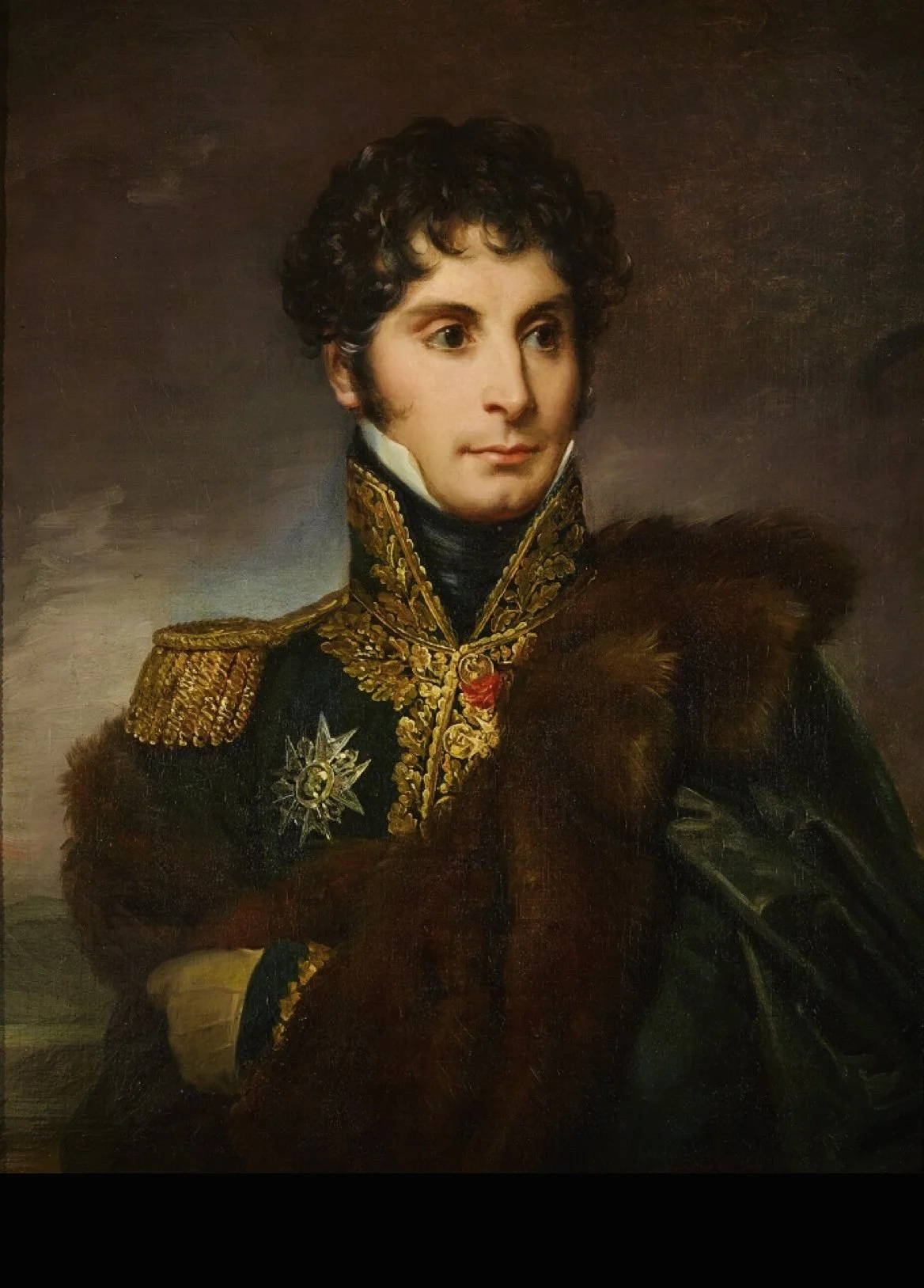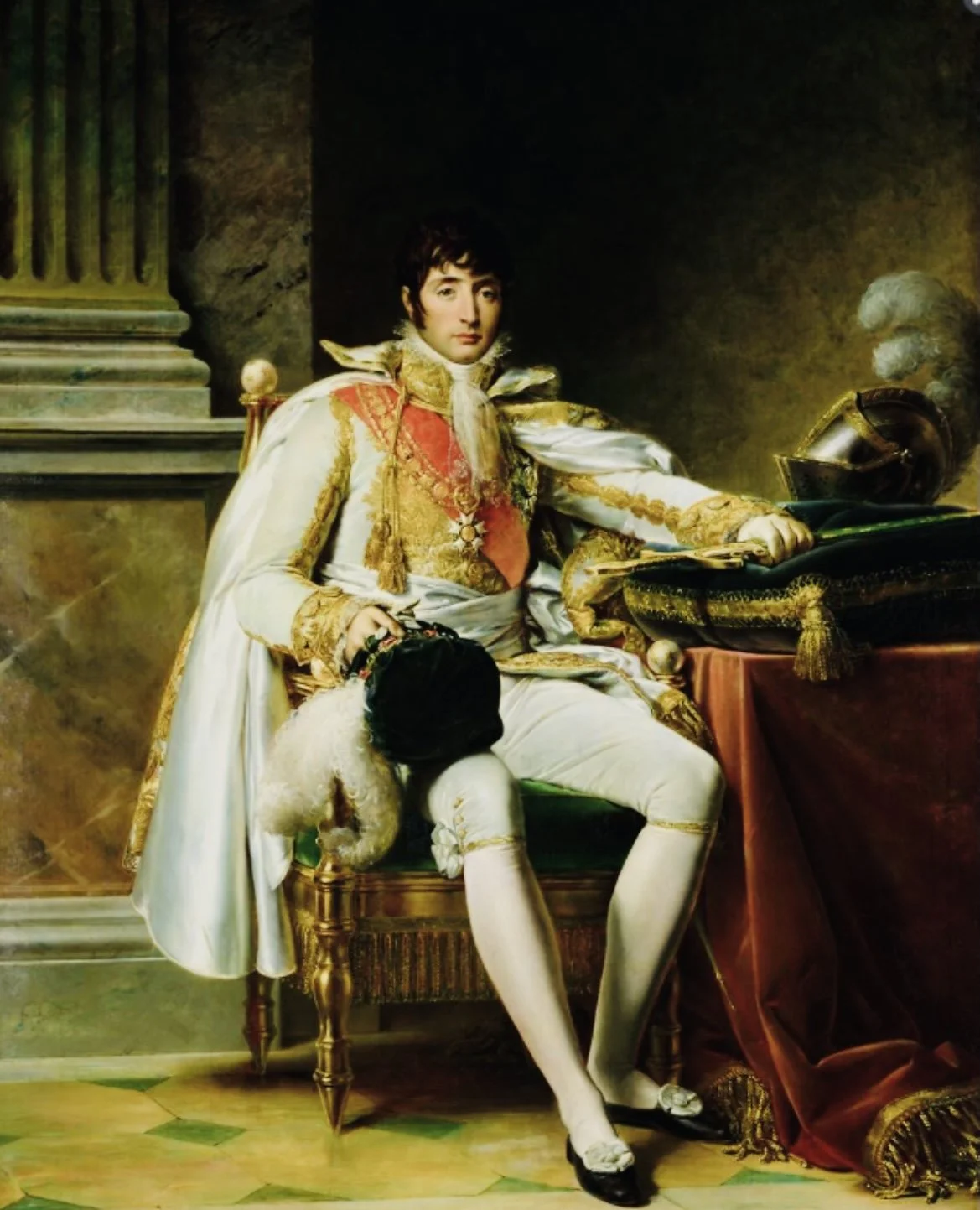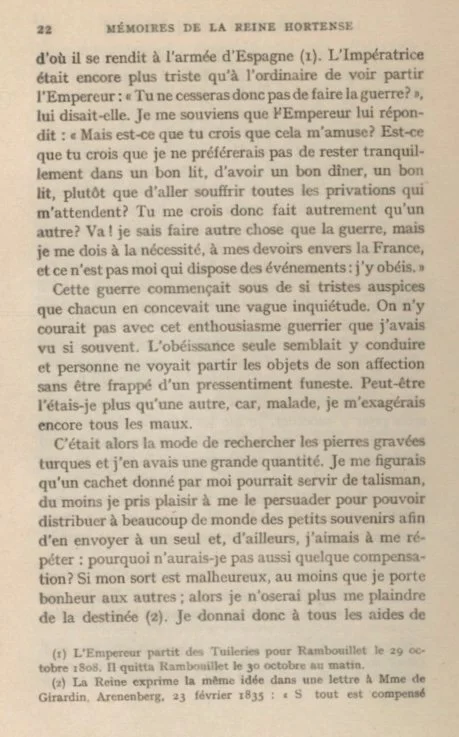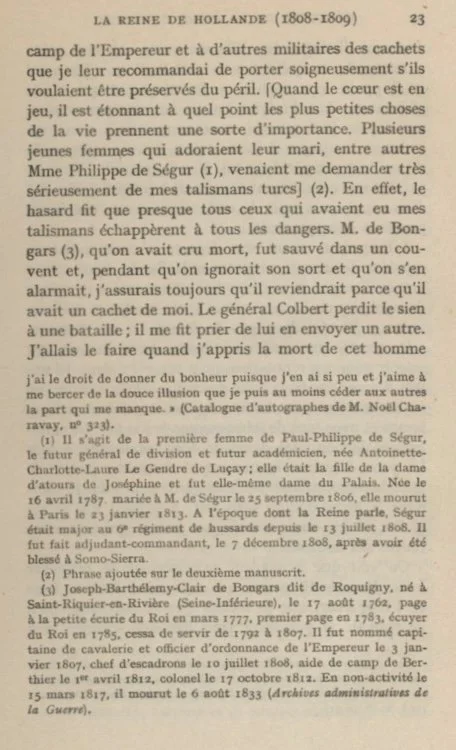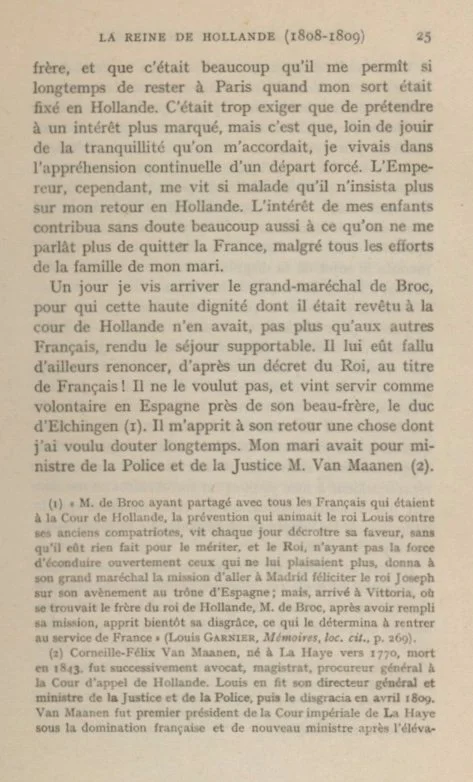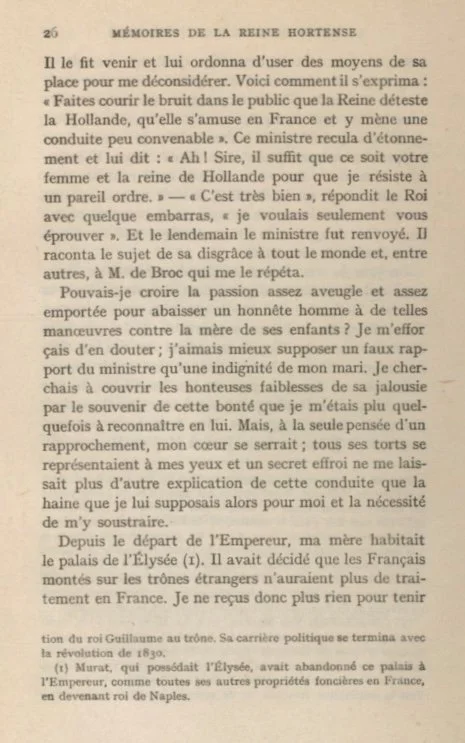Let’s have another look at Hortense’s Memoirs. If you want to read the book it is available for free at the side bar in English and French. Use the widget on the sidebar to translate the text below into pretty much any language.
Hortense seeks refuge from her difficulties by starting a campaign of offering protective stones to soldiers in danger. Napoleon also asks Hortense to return to Louis in Holland but Louis’ passionate hatred towards her makes this a terrible idea.
Hortense’s memoirs continues:
This war began under such unfavorable auspices that everyone was vaguely worried about the outcome. The officers did not undertake it with that martial eagerness which I noticed on other occasions; they only obeyed orders. No one can witness the departure of the persons she cares about without feeling apprehensive.
Perhaps this was particularly true in my own case, for being ill I was inclined to exaggerate all possible harm that the future might bring. It was the fashion just then to collect carved Turkish jewels and I had a large number of them. I imagined that an amulet given by me might act as a talisman; at least I made myself think this, in order to give away a great many little gifts, so as to have an excuse for sending one to a particular person.
Moreover, I said to myself "Why should not my lot have certain compensations? If I am unhappy perhaps at least I can bring good luck to others. In that case I should not complain of my own fate."
I gave all the Emperor's aides-de-camp these little amulets, recommending them to wear the object constantly if they wished to be safe from all danger. When one's sentimental interests are at stake it is astonishing how the smallest things become important. For instance, a number of my young ladies who were very much in love with their husbands, among them Madame Philippe de Segur, came and asked me very seriously for one of my Turkish talismans. As it happened almost all those who wore my amulets escaped every danger. Monsieur de Bongars, for instance, who was thought to be dead, found refuge in a convent.
While he was still missing and when everyone was worried about his fate, I always declared he would come back safely because he had one of my tokens.
General Colbert lost his during an engagement. He wrote asking me to send another. I was about to do so when word reached me that this really distinguished man had been killed. The news was a shock to me and without intending to I exclaimed: "Why did he lose my amulet?"
I realized then that I had come to attach a superstitious importance to something that at first had been merely an idle whim.
After that I always sent a talisman to my brother at the beginning of each new campaign and I should have been worried if he had neglected to wear it constantly.
Everywhere my uneasiness sought for some form of remedy, and I came to consider important things that my reason knew were futile. The Emperor before he left had expressed his hope that I would return to Holland.
After all I had endured, I considered it cruel on his part to oblige me to go back to a man who had made me so miserable.
“Have I no family of my own?" I said to myself. "I seem to live here on sufferance only, whereas they ought to be glad to see me living away from my husband, on account of my reputation to say nothing of my health. I am not guilty of any of the faults of which I am accused. People know it and yet do not take my part. Instead of any longer hiding so jealously the way in which my husband has persecuted me, as I have done up to now, had I not better reveal my sufferings and make my misfortunes known to everyone?
Should I not accuse him openly and demand just compensation for all the pain he has caused me? I took all the blame on myself, therefore it is I who have to pay the penalty for having done right. Now, when I complain, I am treated like a child who protests against his master's treatment.
Thus my distress made me unfair, for I should have remembered that after all I was only the Emperor's stepdaughter, whereas my husband was his own brother. He could not defend me without attacking Louis, and he was already doing a great deal for me in allowing me to remain so long in Paris when I should really have been in Holland.
Doubtless it was on account of my children that the Emperor allowed me to remain so long in France in spite of all the efforts of my husband's family to make me leave sooner. One day I received the visit of Grand Marshal de Broc, who, like the other Frenchmen, did not find his stay at the Dutch court any more agreeable on account of the additional titles he received there.
He had as a matter of fact been commanded by a royal decree to give up his French citizenship. He refused to do so and enlisted as a volunteer in order to serve during the Spanish campaign under the orders of his brother-in-law the Duc d'Elchingen.
He brought me news of something I already suspected. My husband's minister of justice was Monsieur Van Maanen. The King sent for him and gave orders to have everything possible done to discredit me in the eyes of the public. These were the instructions Monsieur Van Maanen received: "Spread reports that the Queen dislikes Holland intensely, that she is enjoying herself in France and that her conduct there is not at all respectable."
The minister drew back in astonishment and said: "But, Sire, she is your wife and Queen of Holland. I cannot do such a thing as that."
“You are right," replied the King suddenly embarrassed; "I was merely testing your loyalty."
The next day the minister was dismissed. He told the reason for his dismissal from office to everyone and among others to Monsieur de Broc, who repeated it to me.
How was I to believe that passion could so far blind an upright man as to induce him to act in such a way toward the mother of his children? I tried to doubt these stories. I preferred to believe that the minister was making a false report rather than think that my husband was behaving in so abject a manner.
I attempted to excuse the mad actions his jealousy made him commit by reminding myself of that kindness of heart which I had several times had occasion to notice in him. But the mere thought of a reconciliation was enough to make my heart sink within me.
All the misery he had inflicted on me reappeared before my eyes. Overcome with fear the only explanation I could find for his conduct was the hatred I imagined he felt toward me, and I realized the necessity of avoiding placing myself within his grasp.
The original French is available below:

